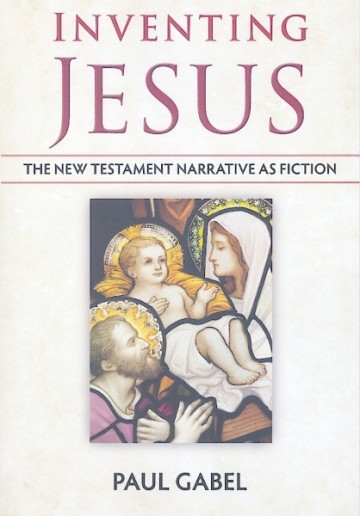By Bill Lehto
 Inventing Jesus: The New Testament Narrative as Fiction, by Paul Gabel
Inventing Jesus: The New Testament Narrative as Fiction, by Paul Gabel
702 pages
©2012, Paul Gabel
In Inventing Jesus, Paul Gabel, a history teacher, argues that Jesus was an entirely fictional character, with no historical basis, having been completely invented by the writer of the Gospel of Mark. The book is 700 pages long, and covers a lot of ground. Gabel is a good writer, and some of his sections provide succinct and balanced summaries of critical thinking on particular topics: his sections on feminism in biblical studies and on the debate over whether Jesus was apocalyptic are good examples. But these sections are just asides to his main augment about the historicity of Jesus.
.Gable’s argument focuses on the fact that there is so little non-canonical evidence for Jesus, since an historical person “would have left more of himself to be discovered outside of what the New Testament contains.” This is a frustratingly feeble argument for at least three reasons.
First, a collection of the available writings on Jesus is what the New Testament primarily is. For him to then argue that there should be more non-biblical written evidence is circular reasoning. He’s stuck in a traditional view of the New Testament as a singular literary creation, as if it has one author, and this is perhaps the biggest flaw with Gabel’s book. The New Testament is not, as evangelicals would have us believe, a single unified story. It is a collection of otherwise largely unrelated writings. Paul was not writing his letters with the gospels in mind, as they had not yet been written. When Matthew and Luke wrote their versions of Mark’s gospel, they were not envisioning later being put alongside Mark in a book.
Second, this was an oral culture, with only a very small percentage of the population able to write. Writing was a difficult, expensive, and time consuming task, and required training that very few people received. That so much, let alone anything, was written on a single first century Galilean Jew is phenomenal. And that we have multiple, independent sources writing about him, Paul only about twenty years after his death, indicates a very strong oral tradition flowing from an historical source.
Third, the non-canonical sources are actually quite rich, although he barely addresses them and sometimes even claims that there is no non-canonical evidence for Jesus. This is simply false. The Gospel of Thomas (a collection of sayings) is an early, independent source for the Jesus tradition according to critical scholars. Another example is the fascinating and critically important lost Q gospel, which was an important source for both Matthew and Luke (but unknown to Mark). And this is just to name a few examples.
I have to admit a personal bias against these efforts at trying to prove that Jesus was not an historical person, and at the way atheists like to jump on this bandwagon. This is a marginal position that very few actual historians or scholars would argue for. I can see the temptation of atheists to side with this thinking: what better way to disqualify the Christian myth than to take away the very foundation of it? But if atheists were to actually take research on the historical Jesus seriously, to actually look at what can be known and what can be conjectured with probability, they might be surprised to find an interesting figure—an iconoclast who challenged the status quo and paid the ultimate price for it. For an interesting take on the historical Jesus from a critical biblical scholar, I recommend John Dominic Crossan’s Jesus: A Revolutionary Biography.

